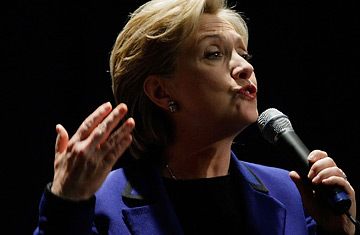
Hillary Clinton campaigns in New Hampshire
New Hampshire Democrats gave Hillary Clinton the chance to recast her campaign, but her central message thus far has put a spotlight on the problems she will face in reaching out beyond the core Democratic constituency.
Clinton's biggest message problem is not merely the fact that she finds herself on the wrong side of the change-versus-experience divide. Her biggest problem is that the experience she's touting is exactly the experience that many voters want to change. The authoress of the "vast right-wing conspiracy" charge is not the candidate to bring left and right together and bridge the hyper-partisan divides of Washington. Yet that's the Hillary Clinton that her campaign has been evoking.
She has rooted her message of experience not in her work in the Senate, or her legal career, or her passion for progress on a few core issues, but on the royal "we" of the Clinton presidency. She was a part of everything, she insists, from health care to foreign policy. To drive the point home, her campaign sent former President Clinton out virtually full-time on the campaign trail across Iowa and New Hampshire. The signature photograph from the Clinton campaign on the day the Iowa caucuses fired the starting gun of the 2008 campaign was not Senator Clinton engaging with voters, but the Clinton couple, Hillary and Bill, having lunch together.
It's probably not fair, but politics is about perception, and for all but the most committed Democratic voters, watching the Clintons together places our experiences with them in a negative and partisan light. With his presidency almost eight years in the rear-view mirror, I can see former President Clinton today and think of the good, bipartisan work he did with former President George H.W. Bush to raise money to help the people of Indonesia after the tsunami. I can appreciate his efforts to reform welfare, or admire his ability to connect with audiences. But when I see the Clintons together, I see a parade of images from impeachment to Monica to Ken Starr that are reminders of Washington at its partisan worst, with Hillary as a harsh and accusatory player. She only underscores this with her frequent complaint — really a reminder — that she's taken "incoming fire."
This does not mean Hillary can never be seen with her husband, or talk about any of her experiences as First Lady. But her campaign is making a fundamental mistake by deliberately invoking this past as the best rationale for a brighter American future. With Barack Obama winning independents and young voters with a call for a united America, with Republican candidates now all calling for a change from the status quo in Washington, Hillary found herself stuck in a losing argument. Her initial reactions only made it worse. She chastised voters for failing to be "realistic," for not understanding that it takes experience to make change happen. It reminded me of an unhappy adult scolding a six-year-old that he's too old to continue believing in Santa Claus. Most of us have a fondness for Santa, at least for the spirit of goodwill and giving that he represents.
Senator Clinton may have finally understood the need for a more forward-looking message in the waning hours of the New Hampshire campaign. She talked more about voters and less about herself. The pundits who said that stress was getting to her when her eyes welled with tears missed the fact that to many of us, she looked more human and less calculating than the candidate we'd seen up until then. On election night, she commanded the stage. We saw her husband for only a brief embrace, and the familiar faces from the previous administration that had flanked her in Iowa were absent.
Barack Obama is right that most voters want Washington to be more hopeful and less divided. They want a leader to appeal to what President Lincoln called the "better angels" of our nature. Former President Clinton spoke often of a "bridge to the 21st century." As advisers meet to retool Senator Clinton's campaign, they might consider that until now, her primary message seemed to be a U-turn to the 20th.
Karen Hughes was Counselor to President George W. Bush in the White House in 2001 and 2002 and played a key role in both his presidential campaigns. From 2005 to 2007, she served as Under Secretary of State for Public Diplomacy and Public Affairs.
